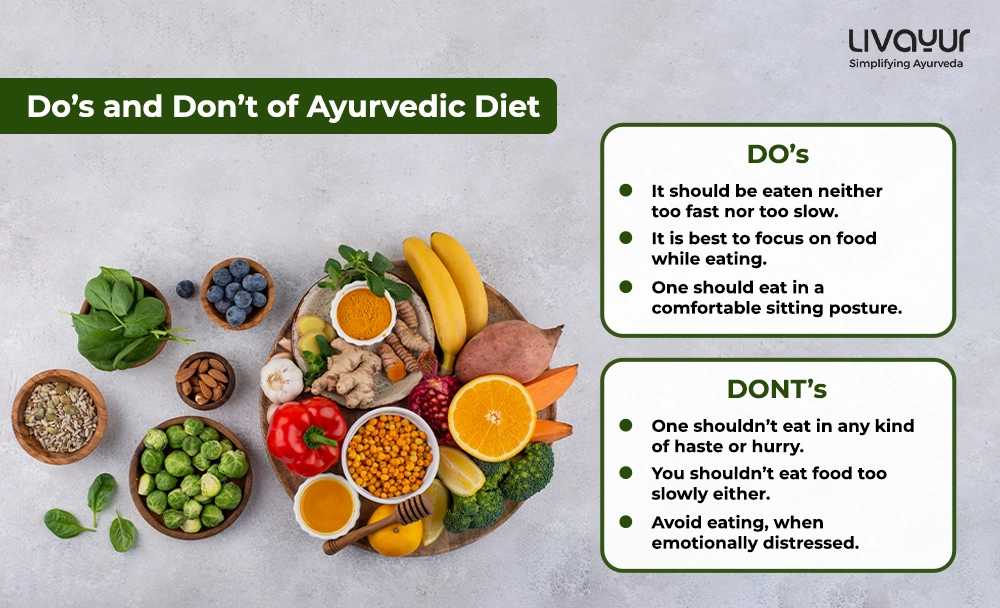
Ayurvedic diets consist of a variety of healthful meals that are quick to digest, packed with nutrients, and able to enhance gut health. Holistic foods are absorbed differently, thanks to traditional Ayurvedic techniques.
We require different dietary sources at various times of the year. Ayurveda always urges us to adjust our diet to the season. It’s necessary to consume a diet that balances dosha which is peaking due to the season, regardless of what a person’s inherent dosha is. Vata and pitta are thought to peak in the summer, late winter and early spring, and late winter and early winter, respectively. [1]
What is an Ayurvedic Diet?
Based on their body type, each person needs a different diet. According to Ayurvedic diet recommendations, a person with a high Vata constitution or Vata imbalances may focus on wet meals to combat the effects of dryness in the body. Whereas, a Kapha-dominant person can balance the weight of Kapha with light, drier, and simple-to-digest foods. Aligning your diet with the season and time of day can also improve digestion and diet.
According to Ayurveda, maintaining and promoting sattva—a clear mental state of truth, contentment, and stability—can be done by following a sattvic diet. [1]
Ayurvedic Diet Recommendations for a Healthy Eating Plan
Consume as much fresh produce as possible. Cook only as much as you need for the day, or at most, the next day. Old food contains little or no life energy (Prana). Wherever possible, avoid canned, preserved, frozen, or microwaved foods.
Take note of how your body feels and how strong your appetite is. Consume only enough light foods to satisfy your hunger. Consume in moderation.
If you’re eating a lot of food, merely eat enough to satisfy half your appetite. It is tough to digest heavy foods. Eat only light foods when sick.
Do’s and Don’t of Ayurvedic Diet [2]
In Ayurveda, the focus isn’t merely on the diet but also, on the way you’re consuming your food. Some things that you should and shouldn’t do while eating are listed here below:
Do’s:
- The food should be tasty, warm, qualitative, buttery, and easily digestible.
- It should be eaten neither too fast nor too slow.
- The food should be eaten only when you’re hungry after digesting the last meal.
- The daily diet should include all the tastes—sweet, salt, sour, pungent, bitter, and astringent.
- We should eat food that is nourishing and suitable to our particular needs and requirements, as well as our mental and emotional temperament.
- It is best to focus on food while eating.
- One should eat in a comfortable sitting posture.
- One should always eat in pleasant surroundings with utensils and preparation of individual’s choice.
Don’ts:
- The food should not be contrary to each other in action (prakriti). E.g. fish and milk together, radish and milk together, honey and ghee in equal quantity.
- One shouldn’t eat in any kind of haste or hurry.
- You shouldn’t eat food too slowly either.
- Avoid eating, when emotionally distressed.
- Too much use of any of the six tastes is not good for health.
Sample Ayurvedic Diet
To have a healthy diet, junk food and foods promoting disease must be avoided. A huge portion of the diet must consist of foods and nutraceuticals that promote health. Nutrient-dense plant foods (vegetables, fresh fruits, beans and legumes, raw nuts, seeds, and avocados), starchy vegetables, whole grains, and phytochemicals that promote health should comprise ninety percent of a daily diet. Here’s a sample diet: [4]
| 7 am | Kulatha/Mudaga (100 g), Yusha (gruel) |
| 10 am | Buttermilk (200 ml) |
| 1 pm | Yava Chapati (2) + Salad (roots like carrots, knolkhol) + Leafy Vegetable (Spinach / Kale / Broccoli / Fenugreek / Amaranth) 100 g + Vegetables (Beans / Cabbage / Ash Gourd) 100 g |
| 4 pm | Mixed Salad (100 g) |
| 7 pm | Yava Chapati (2) + Salad (roots like carrots, knolkhol) + Leafy Vegetable (Spinach / Kale / Broccoli / Fenugreek / Amaranth) 100 g + Vegetables (Beans / Cabbage / Ash Gourd) 100 g |
| 8 pm | Skimmed Off Milk (200 ml) |
Ayurvedic Diet Benefits
Following an Ayurvedic diet plan can have several benefits, such as:
- Helps guard against chronic diseases
An Ayurvedic diet is rich in many nutrients and protects us against various diseases and lifestyle disorders, including cancer, cardiovascular issues, blood pressure, diabetes, peptic ulcers, hypo and hyperthyroidism, PCOD/PCOS, etc. In a lot of prevalent health issues in modern times, dietary changes are suggested by medical professionals as potential remedies. These health issues arise mainly because of mindless eating habits and high consumption of junk food. [1]
- Helps with weight management
To manage your weight, and gain or lose some weight, one needs to follow diets specific to their needs. Ayurvedic diets are said to help with malnutrition as well as obesity. [3]
- Develop a positive relationship with food
Ayurveda says, ‘You are what you eat.’ In a world where everyone is going through a lot, mentally, people struggle to maintain a positive relationship with food. Taking a balanced, Ayurvedic diet allows you to maintain a positive outlook towards food and allow it to nourish not only your body but your soul. A good diet keeps our minds healthy. [2]
Food Combinations to Stay Away from on an Ayurvedic Diet
Poor food pairings might immediately reduce digestive fire and produce toxins. Be mindful of your food pairings. Incorporating some Ayurvedic herbs and foods into your diet while avoiding particular food combinations is crucial for a good diet: [1]
- Milk, fruit, or yogurt shouldn’t be combined with milk.
- When eating radishes, cherries, tomatoes, potatoes, bananas, melons, pork, fish, eggs, citrus fruits, and bread, stay away from milk.
- Any form of the melon shouldn’t be combined with other dishes.
- Keep fresh fruit away from meals (cooked fruits can be eaten with cooked meals)
- Avoid consuming dairy items containing animal protein, such as milk, eggs, cheese, and cream.
- A meal shouldn’t have both heavy and light items, such as cheese and crackers.
Safety and Precautions to follow
Here are a few things to keep in mind:
- The nutritional needs of the elderly are very different from those of young adults. [2]
- Eating a well-balanced diet regularly and staying at an ideal weight are critical factors in maintaining emotional and physical well-being. [2]
- The improper digestion produces ‘Ama’-toxin, which leads to a majority of diseases. E.g. Ama causes Rheumatoid arthritis, which afflicts the joints. [1]
- The relation between faulty food & diseases is well explained if one consumes only Madhura rasa (Sweet) in excess, they may develop diabetes. [1]
- If one regularly consumes articles that are heavy to digest, they may become obese. [1]
- Dietary preferences and dietary requirements of all individuals vary based on various factors like their age group, gender, lifestyle etc. No one diet fits all. [2]
- Always keep your allergies in mind, before you proceed to make any dietary changes. Do consult a medical expert. [2]
FAQs
1. What things shouldn’t be consumed with milk?
When eating radishes, cherries, tomatoes, potatoes, bananas, melons, pork, fish, eggs, citrus fruits, and bread, stay away from milk.
2. Should elderly people follow the same diet as younger ones?
The nutritional needs of the elderly are very different from those of young adults. So, no, they shouldn’t follow the same diet.
3. As per Ayurveda, what causes most diseases?
As per Ayurveda, improper digestion produces ‘ama’-toxin, which leads to the majority of diseases.
Conclusion
Embracing an Ayurvedic diet tailored to individual needs and seasonal variations is a holistic approach to nutrition and dietetics. The emphasis on fresh, easily digestible, and balanced meals not only aids in preventing chronic diseases but also supports weight management and helps foster a positive relationship with food. However, it’s very important to be mindful of the food combinations, adhere to safety precautions, and acknowledge the diverse dietary needs of different age groups. Consultation with a medical expert is advised for personalized dietary adjustments.
















